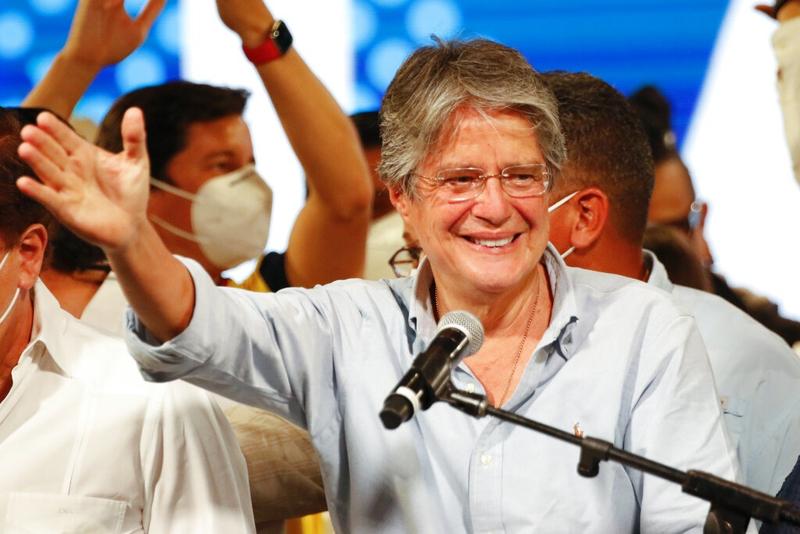 Guillermo Lasso, presidential candidate of Creating Opportunities party, CREO, speaks to supporters after a presidential runoff election at his campaign headquarters in Guayaquil, Ecuador, April 11, 2021.
(ANGEL DEJESUS/AP)
Guillermo Lasso, presidential candidate of Creating Opportunities party, CREO, speaks to supporters after a presidential runoff election at his campaign headquarters in Guayaquil, Ecuador, April 11, 2021.
(ANGEL DEJESUS/AP)
QUITO - Ecuadorean banker Guillermo Lasso has won Sunday's presidential runoff vote against leftist economist Andres Arauz, putting the country on track to maintain open market policies rather than return to socialism.
Arauz conceded his defeat after receiving 47.5 percent of the votes compared with Lasso's 52.5 percent, with 97 percent of poll statements processed, according to figures published by the National Electoral Council.
In a speech to his supporters, Arauz said he would call Lasso and offer his congratulations on the electoral victory.
Banker Guillermo Lasso's victory will be welcomed by foreign investors who were unnerved by Andres Arauz's promises of extensive social spending in the face of weak government finances and a struggling economy
The elections council is due to speak at 10 pm local time (0300 GMT).
ALSO READ: Ecuador ponders return to socialism in presidential runoff
"It's a day in which all Ecuadoreans have decided their future, they have used their vote to express the need for change and the desire for better days," said Lasso at a rally where jubilant supporters chanted "Lasso President!"
Lasso's victory will be welcomed by foreign investors who were unnerved by Arauz's promises of extensive social spending in the face of weak government finances and a struggling economy.
It also bucks a trend of leftist electoral victories in Latin America in nations including Argentina, Chile and Bolivia.
Lasso will take office on May 24.
READ MORE: Virus-weary Ecuadoreans lean toward socialism as polls near
The oil-exporting nation's economy was already weak due to low crude prices when the coronavirus outbreak started. The pandemic has pushed a third of the population of more than 17 million into poverty and left half a million people unemployed.
President Lenin Moreno, who did not seek re-election, imposed painful austerity measures as part of a US$6.5 billion financing agreement with the International Monetary Fund, but was unable to kick-start the economy.
The election council figures show 1.6 million null votes, likely the result of indigenous activist Yaku Perez calling on supporters to spoil their ballots.
Perez ran in the first round vote in February and narrowly lost out to Lasso for a slot in the runoff, which he attributed to electoral fraud despite not presenting evidence.


